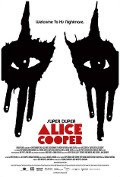
Directed by
Sam Dunn / Reginald Harkema / Scot McFadyen
98 minutes
Rated M
Reviewed by
Chris Thompson

Super Duper Alice Cooper
Synopsis: The story of Vincent Furnier, the Detroit-born preacher's son, who became the iconic rock star, Alice Cooper infamous for his macabre persona and outrageous stage act. It follows him from his early days as front man for The Earwigs in the late 60s through to his struggle with identity and his battles with alcohol and drugs in the 70’s to his triumphant comeback as the godfather of 80’s glam metal.
I was a teenager in the 70’s when I first saw Alice Cooper live at Festival Hall in Melbourne. It was an astounding show; part of the Welcome To My Nightmare tour that marked the shift from a band named Alice Cooper, started by two high school friends in Phoenix Arizona, to Alice Cooper the solo artist. This highly stylised and visually rich film documents twenty years of Cooper’s career leading up to the point at which he must discover whether, after more than one go at rehab, he can still inhabit his stage creation when sober.
The conceit of the film is the Jekyll and Hyde struggle between Vince Furnier, the nice preacher’s boy who didn’t drink and didn’t swear, and the grotesque form that emerged on stage and eventually consumed its creator. To drive the point home, Dunn, Harkema and McFadyen have appropriated John S Robertson’s 1920 silent movie of Dr Jekyll and Mr Hyde and interspersed key scenes at relevant points in the story. It’s an effective device, not just for its thematic underpinning of the story, but also for its visual resonance with Cooper’s performance aesthetic. The gothic-horror world of the tormented soul is a recurring theme in much of Cooper’s music and the influences from old films like Jekyll and Hyde and Robert Wiene’s The Cabinet of Dr. Caligari which is also used quite a lot, are easy to see.
What Cooper himself acknowledges as his early influences are The Beatles and Salvador Dali. It might seem an odd combination, but that’s exactly what the footage from those early days looks and sounds like. (As fate would have it, Cooper ended up on the same festival bill with John Lennon and, later, was sought out by Dali as the subject for a holographic projection project). What we see here reinforces how much of a showman Alice Cooper is. Elton John makes that point and comedian George Burns likens him to a vaudeville performer. At one point, famed concert promoter Bill Graham says, “Either they play fuckin’ music or they fuckin’ act. They’re not doing both on my stage.” What the film shows us is that Graham was wrong; that’s exactly what Alice Cooper did and that’s what so excited the fans.
There’s plenty of great archival footage used in this film and most of the photographic images are manipulated or animated often in a way that is reminiscent of the ‘pan and scan’ style used in The Kid Stays In The Picture. But in a way, the film that this most reminded me of, was the doco All This Mayhem from earlier this year. Like that film, this charts the rapid rise to fame and celebrity of a talented, ambitious star and the damage he does to himself with alcohol, drugs and personal conflicts. It’s not a new story and, despite its excellent visual technique, it doesn’t quite have the impact of that film.
There’s a lot to enjoy here but, in the end, this is probably a film that will appeal more to Alice Cooper fans (and I’ll admit to being one) than it will to the average punter.

Want more about this film?


Want something different?




